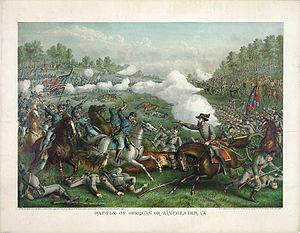Battle of Opequon
| Third Battle of Winchester (Battle of Opequon) |
|||||||
|---|---|---|---|---|---|---|---|
| Part of the American Civil War | |||||||
 Battle of Opequon, chromolithograph by Kurz & Allison, 1893. |
|||||||
|
|||||||
| Belligerents | |||||||
|
|
|
||||||
| Commanders and leaders | |||||||
| Philip Sheridan | Jubal Early | ||||||
| Units involved | |||||||
| Army of the Shenandoah | Army of the Valley | ||||||
| Strength | |||||||
| ∼ 40,000 | 10–12,000 | ||||||
| Casualties and losses | |||||||
| 5,020 | 3,610 | ||||||
The Third Battle of Winchester (or Battle of Opequon), was fought in Winchester, Virginia, on September 19, 1864, during the Valley Campaigns of 1864 in the American Civil War.
As Confederate Lt. Gen. Jubal A. Early raided the B&O Railroad at Martinsburg, WV, Union Maj. Gen. Philip H. Sheridan advanced toward Winchester along the Berryville Pike with the VI Corps and XIX Corps, crossing Opequon Creek. The Union advance was delayed long enough for Early to concentrate his forces to meet the main assault, which continued for several hours. Casualties were very heavy. The Confederate line was gradually driven back toward the town. Mid-afternoon, the VIII Corps and the cavalry turned the Confederate left flank. Early ordered a general retreat. Because of its size, intensity, serious casualties among the general officers on both sides, and its result, many historians consider this the most important conflict of the Shenandoah Valley.
Sheridan was given command of the Army of the Shenandoah and sent to the Shenandoah Valley to deal with Early's Confederate threat. For much of the early fall of 1864, Sheridan and Early had cautiously engaged in minor skirmishes while each side tested the other's strength. Early mistook this limited action to mean that Sheridan was afraid to fight, and he left his army spread out from Martinsburg to Winchester. Sheridan learned of Early's dispersed forces and immediately struck out after Winchester, the location of two previous major engagements during the war, both Confederate victories.
...
Wikipedia
